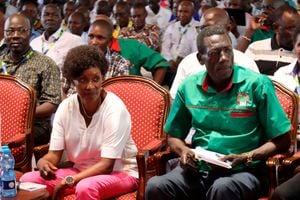
Kenya Union of Post Primary Education Teachers (Kuppet) Secretary General Akello Misori addresses the media following the conclusion of the Annual Delegates Conference in Vihiga on December 20.
The far-reaching constitutional changes, controversially passed during the Kenya Union of Post Primary Education Teachers (Kuppet) Annual Delegates Conference (ADC), removed the age limit for national office holders.
The current retirement age, which members claimed was sneaked in during an ADC in Nairobi last year, was raised from 60 to 65 - a position contested by branch officials and members.
In effect, Secretary General Akello Misori and Treasurer Mwethi Njengga, who had attained the retirement age as per last year’s amendments to the constitution, would now continue to hold office for as long as they are re-elected.
National Chairman Omboko Milemba, who is also the Emuhaya Member of Parliament, Deputy Secretary General Moses Nthurima, and National Organising Secretary Paul Maingi were also expected to retire shortly after the 2026 national election.
“To buttress gender equity and equal opportunities without any form of discrimination on the basis of, inter alia, sex, race, tribe, age, or religion,” the amendments read in part.
The constitutional changes have been contested by a section of union leaders and members, led by embattled Deputy National Treasurer Ronald Tonui, who, along with his supporters, was locked out of the chaotic ADC in Vihiga on Friday.
Mr Tonui has vowed to move to go to court to challenge the changes, which he claimed were forced on members without meeting the legal requirements for public participation by members in the 47 branches.
“The constitutional amendments have not been subjected to due process, including public participation by members, tabling the changes before the National Executive Board and the National Governing Council, before being brought for approval by the Annual Delegates Conference (ADC),” Mr Tonui said.
The changes also created positions for nine trustees, eight of whom shall be elected at the Delegates Conference, with the ninth position occupied by the founder Secretary General until the occupant is rendered ineligible.
The National Executive Board shall comprise 14 elected national officials, reflecting regional, gender balance, disability inclusion, and Junior Secondary representation.
Branch officials seeking to contest any national position will now be required to resign from their positions first, paving the way for by-elections in the branches.
It states that any branch official seeking to contest a national office should first resign from his or her current position 31 days before the poll is held.
“Only members of the National Executive Board and the Branches Executive Committee members shall qualify to contest at the national union elections,” the amendment clause states.
The changes have also opened up space for Junior Secondary teachers to be represented at both branch and national levels.
Four new positions have been created at the National Executive Board, while nine trustee positions have been formed under the changes.
The constitutional amendment is seen as one tied to the 2026 general election, which the union is gearing up for after the five-year period from the last poll held in 2021.
New positions created include first assistant national gender secretary, second assistant national gender secretary, third assistant national gender secretary, and assistant national secretary junior secondary.
The amendments also created Regional Councils, consisting of branch chairmen, executive secretaries, branch secretaries, and women representatives – each elected from respective branches within the regions.
The Regional Councils – premised on the former administrative provinces (Rift Valley, Central, Nairobi, Eastern, North Eastern, Western, Nyanza, and Coast) – shall have officials elected every five years and mandated to meet twice a year.
Their operations will be financed by branches and grants, which shall be approved by the National Executive Board.
Nomination fees for the various elective positions have risen sharply following the constitutional amendments, with the positions of Secretary General, National Chairman and National Treasurer attracting Sh500,000.
Deputy Secretary General, National Vice Chairman, National Organising Secretary, National Gender Secretary, National Secretary Secondary, National Secretary Treasury, and Assistant National Treasurer will pay Sh300,000 to be cleared to contest the positions.
Branch secretaries, chairpersons, vice-chairpersons, assistant secretaries, organising secretaries, gender secretaries, secondary secretaries and tertiary secretaries will pay Sh50,000 to contest the positions.
Initially, candidates for branch secretaries’ positions paid Sh50,000, while those seeking other branch positions paid Sh10,000. National officials were charged Sh100,000.
“The changes are clearly aimed at locking out popular branch officials from ascending to national office. It condemns them to remain static at the branch level, which is discriminatory. I can assure you this will be challenged,” an official said on Saturday.
Another official said that attempts to muzzle and gag branches, as well as remove national officials seen to have the backing of teachers, would be counterproductive for the movers of the changes.
“It is very clear that the national officials want to cling to power by forcing constitutional amendments, which they failed to see through in the 2023 ADC. They may have succeeded in the interim, but we want to assure them that justice for the teachers will prevail in the end,” a branch executive secretary who declined to be named stated.
The union has been rocked by leadership wrangles for the last year, following an attempt to change the constitution in the 2023 ADC and the manner in which the August 25, 2024, teachers’ strike was called off on September 2, 2024.
Some branch officials have accused national officials of failing to consult them before taking far-reaching decisions affecting members.
“The day looked heavy, but thank God we managed it. Unions are made of chaos. Constitutional amendments usually face resistance, but they end up accepted by the majority,” Mr Milemba said after the ADC meeting.
Mr Misori said the changes had broadened the National Executive Board and created regional offices to deal with emerging issues.












